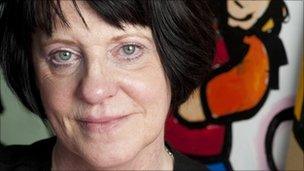Schools urged to listen more to children
- Published

Dr Atkinson says policy-makers should see issues through children's eyes
Children should be given more say in the running of their schools, England's Children's Commissioner says.
Dr Maggie Atkinson also calls for their voices to be heard when education policy and other laws affecting them are changed.
She adds that they have a right to be heard under the UN Convention on the Rights of the Child.
The Department for Education says it regularly hears the views of children.
Speaking at the annual lecture of education charity National Education Trust, in London, Dr Atkinson said she wanted a system where children and young people were taken seriously in the running of their schools.
"This does not mean putting pupils in charge, or having teachers either subjugate their rights or abdicate their responsibilities," she said.
"Young people I meet are clear they have serious responsibilities to their schools.
"Teachers must have the time and space to teach without disruption, and the tools to maintain orderly classrooms."
'Eyes of the child'
She said: "The quality of just about every setting, in and beyond schools, can be richly informed, I dare to say improved, if the voice of the child or young person has a legitimate place and they know it will be heard, whether or not they always get what they say they want.
"Done well, as I have seen in schools across the country, the activation of and attention to users' voices is not a threat to order or discipline.
"Done well, it confirms rather than undermining the right of the adult to be the adult, including as holders of authority."
And she encouraged policy-makers to listen to children too.
Dr Atkinson quoted Article 3 of the UN Convention: "Everything we do must have the child's best interests at heart."
She added: "If that means adapting to issues through the eyes of the child, so be it.
'Abuse of student voice'
"The demands of this article on the adaptation of our professional practice should not be underestimated as we change laws on education, and on its inspection and regulation."
General secretary of the Nasuwt teaching union Chris Keates said giving students a voice in school could be an extremely powerful aid to learning.
She added: "Unfortunately, all too frequently the Nasuwt has encountered practice in some schools which can only be described as the abuse of student voice.
"Children and young people under the guise of student voice are manipulated and used as a management tool to monitor teaching staff.
"Feedback from young people is manipulated to undermine individual teachers. Pupils are used inappropriately to observe classroom practice and to interview staff."
A Department for Education spokeswoman said: "Ministers listen to the views of children and young people on matters that affect their lives.
"We work closely with the experts in the children's sector including the Office of the Children's Commissioner and the Children's Rights Director to gauge what young people think about government policies."
- Published21 March 2011